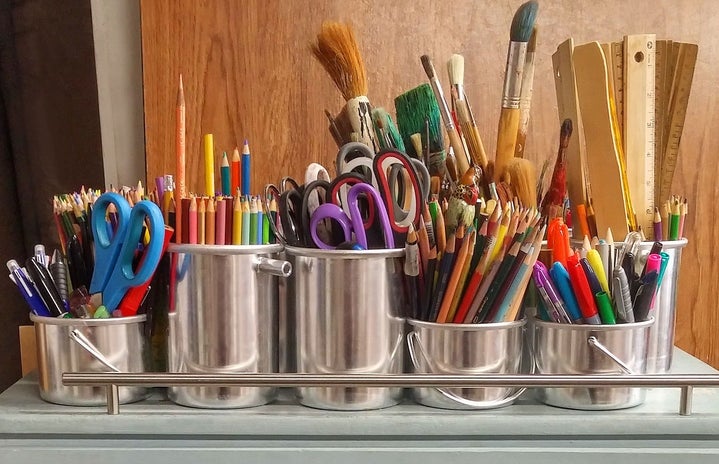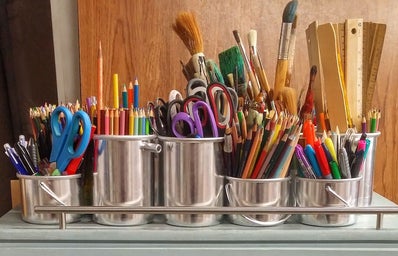I learned a lot during my time in AFO and even more after entering my major. Pursuing an art degree at VCU is so much more than just learning how to paint, draw or take a photo. Some of the lessons learned in art school can be applied to just about any endeavor. Even though I’m grateful for every lesson learned, including those learned the hard way, there are a few things I wish I would have known during my time in AFO.
1. Don’t Limit Your Expectations of Yourself
When I started my AFO journey, lots of my pieces were pretty terrible compared to most of my classmates’ works. While I was disappointed, I tried to assure myself that it was okay because I was working hard and I was spending about as much time as everyone else on the project. I was ready to tell anyone that would listen that I had no real art experience and the only kind of art I could do was photography. The real problem was when I entered my major I didn’t become a super star and I was still struggling in a few of my studios. I finally realized that it isn’t about doing what everyone else is doing, and if I have to work harder or longer on a project to make it the best that I can, then so be it. VCUArts is a competitive program and it isn’t supposed to get easier after you are accepted. Don’t make excuses or limit your expectations for yourself because you are capable of so much more than you realize.
2. Trust Your Gut
Some students enter AFO with no real idea of what they want to major in and others know exactly what they want. For those who know exactly what they want, be warned that at some point someone may try to change your mind or redirect you. You may hear a teacher tell you that you shouldn’t know exactly what you want to major in or you may hear about how many people change their minds about their major direction. While it is important to maintain an open mind and experience different mediums, don’t feel guilty for knowing what you want. You are the only one who really knows all of your dreams, goals, ambitions and plans. After respectfully considering the input of others, don’t feel bad if your gut still sticks to your initial plan.
3. Some Teachers Will Like Your Work and Some Won’t
I’ve had multiple art teachers remind my fellow students and me that we are not supposed to make our work for them. It is so easy to rely on the project guidelines as a formula for making work, but when you do this they become a ceiling that limits the potential of the work. When you make art solely to meet project guidelines chances are you won’t like the work you make, and sometimes you will not receive the grade you think you deserve. If you are making solid work and work you are proud of, chances are someone will be able to like and appreciate it, even if it’s not the person handing out the grade.
4. Try To Make Friends Both Inside and Outside Your Intended Major
Many art students will tell you that the friends you meet in AFO are friends that will last the rest of your college career and perhaps even beyond. Make an effort to make friends with people both inside and outside of the major you plan on applying to. It is nice to have friends with different strengths for help and collaboration purposes. These friends may be able to expose you to new art or inspire you in an unexpected way. It is also very important to try to make a few friends that plan on applying to the same major as you. While you have time to make department-specific friends, it can be very lonely going in when you don’t really know anyone. I found it a bit difficult in the beginning to truly feel connected to the people in my major because they had a lot of shared memories and experiences with a stronger bond that I was not a part of. Ultimately, the more people you meet and befriend, the better your art school experience will be.
5. People Will Always Give You The Look
When someone finds out you are an art major, you will almost always get an unwanted look or comment about your decision. People (especially outside of VCU), do not seem to understand how difficult pursuing an art degree really is. They may tell you art is a hobby and not a career path or wish you luck in finding a job with a “knowing” look. These reactions may be jarring or upsetting, but your major is just as valid as anyone else’s. You are going to work really hard on your chosen path and whether or not you decide to try to work as an artist full time, your art school experience will give you a work ethic you can apply to any job. The learning done in art school is about so much more than memorizing just for a test. It is a continued pursuit of artistic and personal growth.
6. Celebrate Critiques
You will inevitably have “good” critiques and “bad” critiques during your time at VCU. The critiques that make you feel great about your work and the critiques that make you question everything about the piece both have their value. It’s okay to celebrate the positive feedback and take a moment to feel inspired and encouraged by all the effort you’ve made. It’s also okay to take a moment to feel sad when you’ve had a critique you feel is bad. The important thing is what you do with the feedback. Let the good and the bad fuel and inspire your work. Just because one piece isn’t well received doesn’t mean your art is bad and doesn’t mean you don’t belong.
AFO will be a learning experience and chances are it will be different than any experience you’ve ever had before. The environment is a lot different than a traditional high school. Most of your classes will be art classes, which is likely going to be a new experience. The most important piece of advice I can give is that whatever you do, make the most of your time at VCUArts because we will never have an experience like this again.
**photo credit VCU Parking and Transportation**


